Most people think dementia is only about forgetfulness, but there is so much more to it. One of the most concerning and challenging issues for caregivers is dealing with bowel and bladder problems. When you’re caring for someone with dementia, these issues can arise unexpectedly and can be overwhelming.
As someone who has been through it all, I’ve seen everything from emergency surgery for bowel obstructions to finding poop in unexpected places like small garbage cans and closets. These situations aren’t uncommon, and understanding how to handle them can make a world of difference. This article is here to walk you through the bowel basics and share some of the main challenges you might face with your loved one.


A Story from the Heart: A Difficult Day at the Restaurant
Let me share a personal story that you might relate to. I remember sitting in a restaurant with my loved one who had dementia. We were enjoying a nice meal when suddenly I noticed that familiar smell… their bowels had moved while we were sitting there eating. I felt the heat of embarrassment rising up my neck. I glanced around, hoping no one else had noticed. But I couldn’t just sit there. I had to act quickly and calmly.
Getting them up and to the restroom wasn’t easy, especially with them not fully understanding what was happening. Once we made it there, the cleanup began. It was messy and stressful. I was fumbling through my bag for wipes and a new diaper, all while trying to comfort them, who was confused and upset. After what felt like forever, I managed to get them cleaned up and back to the table. But by then, I was frazzled, and the meal had lost its charm.
What I learned from that experience is the importance of being prepared and keeping a level head. I started carrying a “care kit” everywhere – wipes, gloves, extra clothes, and even disposable bags for soiled items. And more importantly, I learned that even though these situations are embarrassing, they’re just part of the journey. We can’t always prevent these moments, but we can prepare for them and do our best to handle them with kindness and patience.

Dementia Poop Basics
The bowels slow down with aging and decreased mobility, causing the waste to move slower. This slowing leads to increased difficulty moving the bowels. Moving the bowels infrequently (less than three times a week) or difficulty passing stool is known as constipation.
Constipation can be painful with abdominal fullness, gas, and cramping and may lead to a bowel obstruction. Bowel obstruction can be severe and lead to a medical emergency. For people in the later stages of the disease, constipation and discomfort can lead to agitation. Unfortunately, they don’t know what’s happening or how to tell the caregiver they are hurting. It is so important for caregivers to track their loved ones’ bowels.
Check out my Understanding Dementia course to learn more about how the stages of dementia can affect bodily functions like bowel movements.
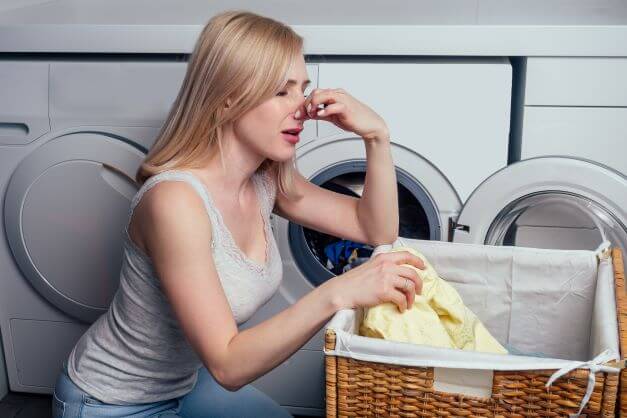
Diarrhea
Diarrhea is a nightmare for any caregiver, especially when your loved one is incontinent. Diarrhea is frequent, loose, watery stools, and if your loved one is still mobile, cleanup becomes even more challenging.
If your loved one has diarrhea, it’s important to look for possible causes, such as medications, food, bacteria, or even artificial sweeteners. If diarrhea lasts for more than a few days, dehydration becomes a serious concern. Dehydration can lead to delirium, which is a severe condition. Contact your doctor if any of the following occur:
- Diarrhea lasts longer than two days
- Your loved one becomes dehydrated
- They have severe abdominal or rectal pain
- Their stools are bloody or black
- They develop a fever above 102°F
Learn more about dehydration HERE.

Incontinence
Incontinence can happen when your loved one no longer recognizes the urge to go to the bathroom. They may not even be aware that their bowels have moved. Recognizing their cues early on can help—some people get restless, pull at their clothing, or turn red in the face.
Once accidents start happening, it’s time to use incontinence products. There are many different types available, and finding the right product for your loved one can make life easier. Learning the signs and responding quickly can sometimes help prevent accidents.
You can learn more about the many products used for incontinence HERE.
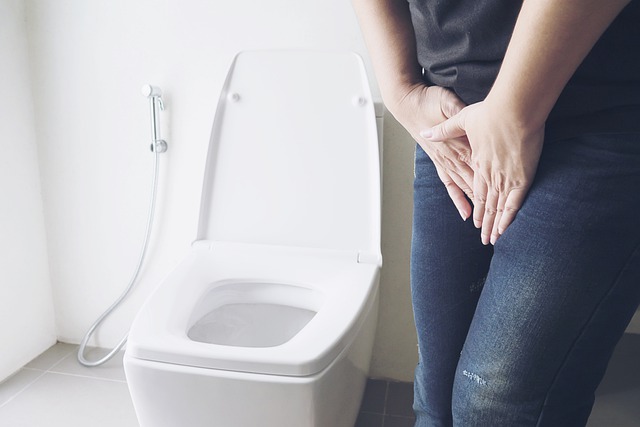
Too Many Steps?
As dementia progresses, everyday tasks become more complex for your loved one. In the middle stage, the steps involved in using the bathroom become difficult or even impossible to coordinate.
- Find the bathroom
- Recognize the toilet
- Pull down pants,
- Sit on toilet
- Poop
- Wipe
- Pull up pants
- Flush the toilet
- Wash hands
For someone with dementia, that is a lot of steps to remember!
So, if you are having problems in these areas, try to figure out which step is causing the issue and adjust your assistance accordingly.
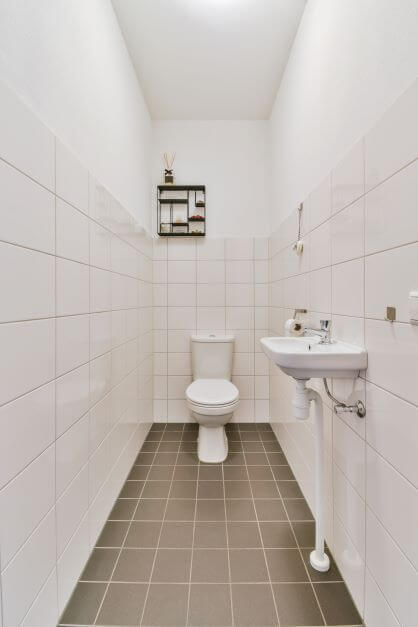
Where Is The Bathroom?
Toileting problems can occur at any of these steps and usually do. For example, problems finding the bathroom may result in finding messes in the wrong room. However, making sure the bathroom is easy to find, closing all other doors, and adding locks may help.
If the problem is at night, ensure the bathroom is well-lit, and the rest of the hallway is dark.
They may fail to recognize the toilet. Many caregivers have found that their loved one used a small round garbage can instead of the toilet, even when it is right next to the toilet. Leaving the toilet lid open, using a different-colored toilet seat, and removing the garbage may help stop this issue.
Find Onesie on Amazon HERE
Dementia Poop “Oh My It’s Everywhere”!
Sometimes, things can get even more complicated. Your loved one might remove their pull-up or diaper and poop on the floor. The situation can escalate if they then touch the poop, not realizing what’s happened. Many caregivers have shared stories about finding poop smeared everywhere.
In these cases, your loved one may have felt discomfort in that area and explored it with their hands, not understanding what was happening. To prepare, keep a manicure kit handy for cleaning under fingernails, and remember that soaking hands in warm, soapy water can help get rid of the mess. You can find them HERE.
Managing these types of issues requires creativity and patience. To prevent your loved one from accessing their pull-ups or diapers, you may want to consider using clothing that restricts access to that area, such as adult onesies worn backward.
Toileting Schedules
Having a toileting schedule can also help prevent incontinence episodes. Taking them to the toilet every 2 hours will help. Nursing has done this for many, many years.
Also, take a look at their diet. Giving them coffee or prune juice at breakfast can help wake up the bowels and get them moving soon after. These are natural laxatives and will help you keep them on a routine.
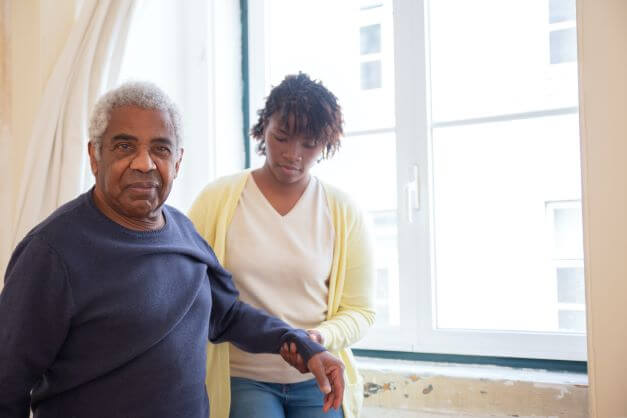

Understanding the different over-the-counter bowel Medications
When bowel issues begin, caregivers often want to help but may not know where to start. Understanding the types of bowel medications can help you choose the right one for your loved one. Here’s a quick guide:
-
Fiber:
Adds bulk to the stool by absorbing water, but remember to push fluids to prevent blockages. Examples include Citrucel and Metamucil.
-
Stool Softeners:
Draw water into the intestines to soften the stool. Colace is a typical example.
-
Stimulants:
Encourage the intestines to contract and move the bowels. Dulcolax and Sennokot are common choices.
-
Osmotics:
Draw water into the large intestine, softening the stool. They may cause cramping, diarrhea, or nausea. Examples include Milk of Magnesia and Magnesium Citrate. Many contain Magnesia; it is essential to check with the doctor first if your loved one has heart or kidney failure.
-
Suppositories:
These are inserted into the rectum to stimulate bowel movements, often by softening the stool. Glycerin and bisacodyl (Dulcolax) are typical choices.
-
Enemas:
Inject fluid directly into the rectum to soften the stool and prompt bowel movements.
Establishing a bowel plan with your doctor’s guidance can help prevent constipation before it becomes a bigger issue.

Why You Need to Track the Bowels
As a caregiver, tracking your loved one’s bowel movements is an essential part of their overall health and well-being. Bowel problems are common in those with dementia, especially as the disease progresses. Tracking the bowels is not just about noticing changes in stool consistency, but also about identifying patterns that might point to bigger health issues, such as constipation, diarrhea, or incontinence.
In the later stages of dementia, your loved one might not be able to communicate that they are having discomfort or pain. The inability to express themselves means that caregivers need to be extra vigilant in noticing signs of discomfort, agitation, or changes in behavior, all of which could be linked to bowel issues.
Here’s why tracking is so crucial:
- Constipation can lead to serious health issues like bowel obstructions, which can cause pain, discomfort, and even emergency situations. Recognizing early signs of constipation (less frequent bowel movements, straining, abdominal discomfort) can help prevent these complications.
- Diarrhea can lead to dehydration, which in turn can cause confusion, delirium, and other health problems. Tracking diarrhea and monitoring for any persistent symptoms is key in managing these risks.
- Incontinence is another challenging symptom, and by tracking it, you can intervene more quickly when it happens. Understanding the frequency and patterns can help you develop a more proactive toileting schedule and reduce accidents.
By consistently tracking your loved one’s bowel habits, you’ll be able to identify potential issues before they escalate, preventing unnecessary discomfort and minimizing the risk of medical emergencies.
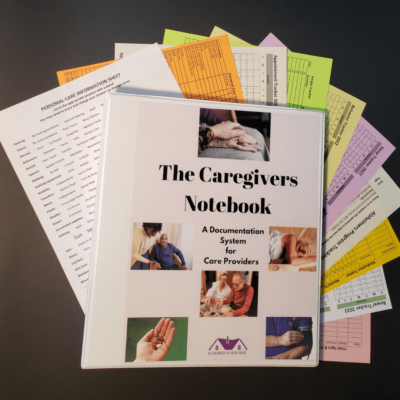
How ALZlog: The Caregiver’s Notebook Can Help Track Bowel Movements
Alzlog: The Caregiver’s Notebook tracks dementia progression and symptoms. It can be a game-changer when it comes to managing bowel issues. Many caregivers don’t know what to track or how to track it effectively, which is where Alzlog steps in to simplify the process.
Here’s how Alzlog can assist:
- Track bowel movements: With Alzlog, you can easily log the frequency, consistency, and any issues related to bowel movements. Whether it’s constipation, diarrhea, or incontinence, you can make detailed notes that can be shared with doctors to ensure proper treatment.
- Monitor patterns: Over time, Alzlog will give you a visual representation of bowel movement patterns. This can help you spot changes or irregularities, which is crucial for determining if there is an underlying issue or if medications need to be adjusted.
- Record other related symptoms: In addition to bowel movements, Alzlog allows you to track other symptoms that may affect bowel health, such as changes in appetite, fluid intake, or medication use. By capturing all these factors, you can get a clearer picture of what’s happening with your loved one’s health.
- Collaborate with healthcare providers: By having a complete record of your loved one’s bowel habits, you can share this information with healthcare providers more effectively. This helps ensure that your loved one gets the best possible care and that doctors have all the information they need to adjust treatments or medications.
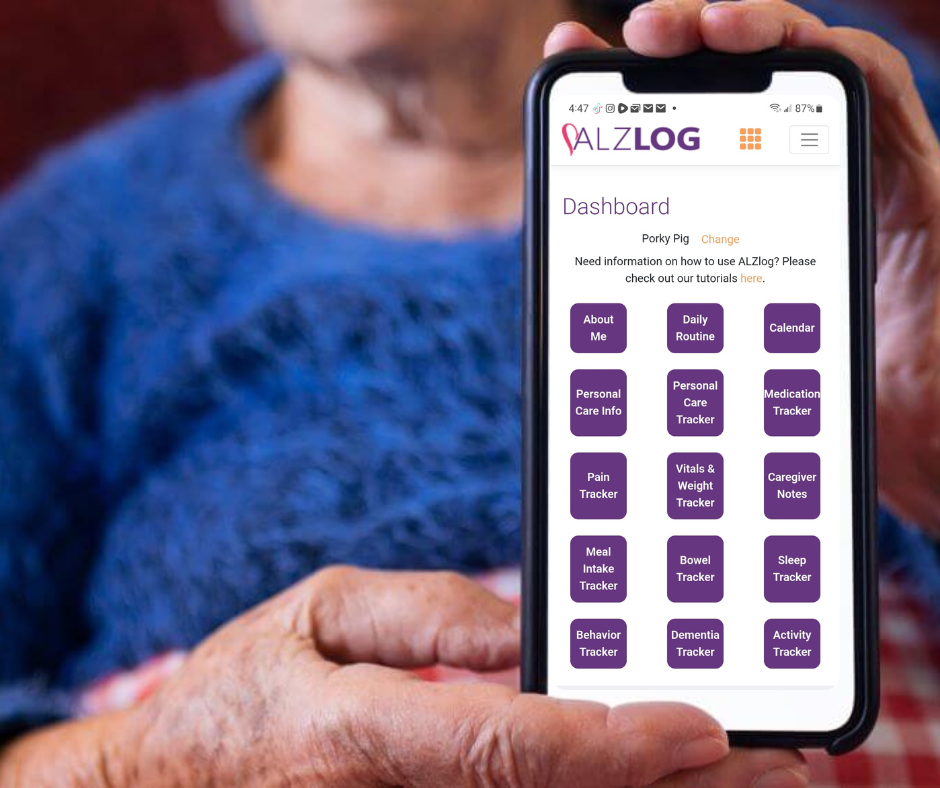
Making Tracking a Part of Your Routine
Using Alzlog to track bowel movements becomes especially helpful when your loved one reaches the point where they can no longer communicate their needs. It’s easy to forget or overlook something like a missed bowel movement or a subtle sign of discomfort, but having everything in one place helps you stay organized and focused on your loved one’s care.
Incorporating this into your routine gives you peace of mind knowing that you have all the information you need to respond promptly when an issue arises. Plus, it can make managing care easier for other family members or caregivers who may step in to help.
Alzlog gives you the tools to track, document, and share information quickly, so you can stay ahead of potential bowel issues and address them before they cause more significant problems.
Tracking bowel movements might not be the most glamorous part of caregiving, but it’s one of the most important. With Alzlog, it becomes a simple, organized, and effective way to make sure your loved one gets the best care possible.
Toilet Issues and Interventions
Toileting issues can extend beyond pooping and into the realm of fascination with flushing things. Many caregivers have spent a lot of money on plumbers due to their loved one’s obsession with putting things in the toilet.
I recommend keeping a single partial toilet paper roll in the bathroom. Otherwise, they may use a whole roll at a time. Another tip is not to leave wipes in the bathroom. Even though the label says you can flush them, they can clog your system. This video helps explain wipes in the sewer system. https://youtu.be/rcfucpVNPOo
Another trick some caregivers have used is to turn off the valve behind the toilet to prevent flushing. One family started doing this after their third plumber’s visit for a clogged toilet.
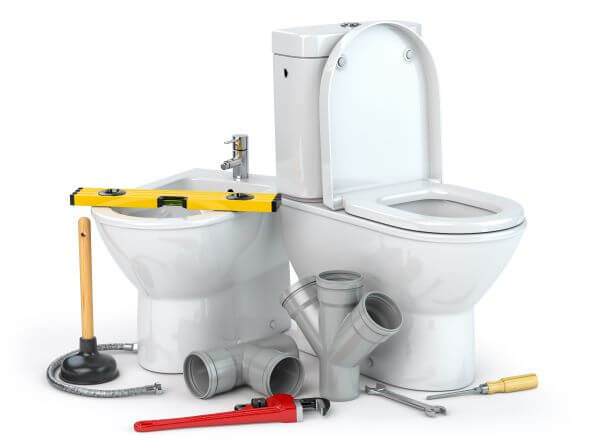
Cleanup Tips
Cleaning up after an accident is no easy feat. A handheld shower sprayer can help, and many caregivers find that bidets work wonders. Keep disinfectant wipes nearby to wipe down doorknobs and other surfaces. It’s also smart to have a cleanup kit ready with gloves, small garbage bags, and a jar of Vicks.
The Vicks helps mask the odor. Put a little bit in or under each nostril; it usually overpowers the smell. This is an old nursing trick that I have used for many years.

Know Your Limits
For many caregivers, dealing with toileting and poop issues is the hardest part of the job. It’s okay to recognize your limits. Some caregivers move their loved ones to a facility when they can no longer handle the cleanup. Only you know what your breaking point is, and it’s important to take care of yourself while caring for your loved one.

Conclusion: Navigating Dementia Poop Challenges with Care and Practical Solutions
Managing bowel issues in dementia care is tough, but understanding the basics, anticipating issues, and having the right tools and mindset can help. By preparing yourself with strategies like a toileting schedule, a go-bag of supplies, and interventions for common issues, you can minimize the stress and create a better experience for both you and your loved one.
Remember, you’re not alone. These challenges are difficult, but they’re a normal part of the dementia journey. By sharing our experiences and learning from one another, we can support each other through these tough times.
Wishing you strength and resilience on your caregiving journey! 🌼
Hi, I'm Larea, I am a Registered Nurse specializing in Dementia Care, with 30 years of experience supporting dementia patients and their families. Over the years, I have provided care in diverse settings, including homes, hospitals, nursing homes, assisted living facilities, and hospice. My passion is guiding caregivers, sharing my knowledge and experience to help them navigate the challenges of dementia care with confidence and compassion.

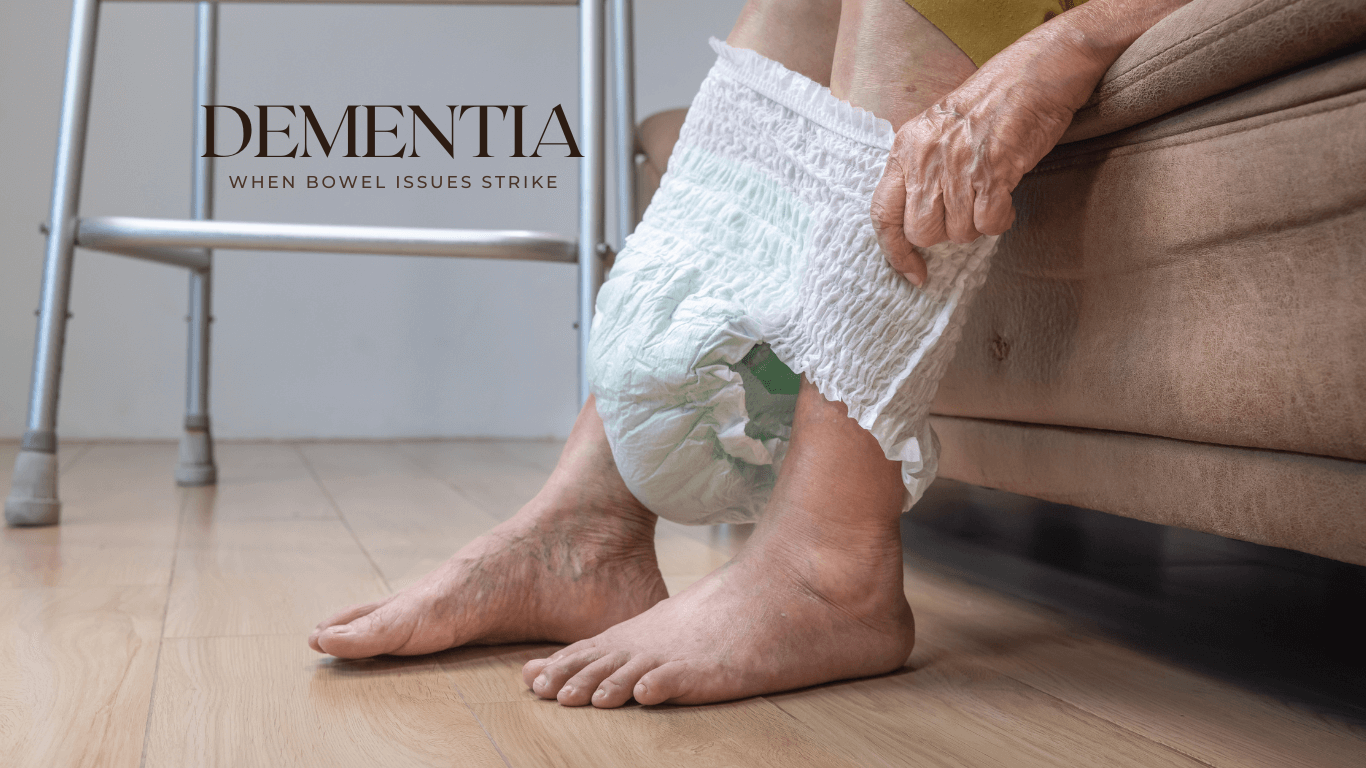








0 Comments